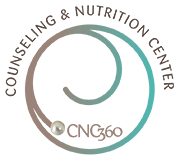by Heather Bell, MPH, RD,LDN
Hello, Everyone—
For those of you who don’t know me, I’m Heather Bell, one of the nutrition therapists here at Counseling and Nutrition Center 360. And as of this past June, I’m also a Life Coach, working with women virtually as part of my private practice in Newburyport, MA.
Lisa Pearl suggested that I take a moment to introduce my new specialty, and to talk about how I incorporate coaching with clients, both at CNC 360 and in my own practice.
To me, coaching is about creating three things: inspiration, action, and willingness.
Inspiration comes first, because it’s the spark of joy and vitality that causes us to reach for something more in ourselves and in our lives. Inspiration is about operating from a place of possibility and expansiveness and excitement—and it does not come naturally for most human beings. With our evolutionary tendency to think in terms of worst-case scenarios, and to stay with familiar patterns, it’s hard to create and maintain the momentum for change—even when we’re really hungry for it. In my experience, coaching creates a unique space in which to reach for big, “impossible” things, and in doing so, to step into lives that are profoundly more vibrant and fulfilling.
Action is next, because without action, even the most ambitious dreams can’t deliver transformation. Coaching encourages us to take action NOW—without waiting to feel “confident,” “deserving,” or any other variation on “ready.” Why? Because left to our own devices, we tend to let our brains talk us out of the change and growth we need. We put off making powerful choices, and spin in indecision instead. What a waste of time and possibility!
(Remember that evolutionary preference for familiarity? Our brains are super-good at coming up with every reason under the sun for not moving outside our comfort zones or taking risks. They’ll use whatever it takes– predictions of future disaster, memories of past failures, barrages of self-criticism—anything to keep us doing what we’ve always done. And getting what we’ve always gotten. Argh.)
Coaching helps us acclimatize to making powerful decisions again and again as we move towards the results we want to create, and teaches us that while success is awesome, failure is actually the next best thing for anyone who wants to grow. Seriously, what would we all be willing to go after in our lives if we weren’t afraid of failing?!
Lastly, the quiet super-power that fuels our capacity for change is willingness—specifically, the willingness to feel certain kinds of emotional discomfort. Think about the last time you went after a really big goal, or made a big change in your life—buying a home, applying to college, moving cross country, leaving a job. You might have felt excitement, but there was probably a certain amount of discomfort, too—uncertainty, second-guessing, risk, self-doubt. In fact, it’s fair to say that any time we go after something important, it will bring up our emotional baggage—that’s one of the really cool things about setting big goals. But if we don’t know to expect this discomfort, we can find ourselves buying into the self-doubt and drowning in “what if” scenarios that stop us in our tracks, or prevent us from ever getting started. Working with a coach means having a partner who can help bring awareness to these inevitable moments, and who can share skills that allow us to get unstuck from thoughts and feelings and stay in action—no matter what shows up as part of the journey toward our desired results. We are much more likely to go after what’s important to us if we know we have the key to not quitting when the going gets tough, right?
So clearly, I’m excited about what coaching has to offer! Having said that, though, it’s not necessarily the right choice for everyone. Some people will need clinical support in order to effectively treat or manage a diagnosis; these people deserve the breadth and depth of expertise that qualified medical and psychological professionals provide. More than this, I’ve found that talented clinicians are able to honor clients’ historical struggles with their illnesses in a way that creates the richest possible experience of self-understanding and integration. For many people it’s this sense of wholeness that allows them to successfully heal, and once this healing has taken place, it’s a hugely supportive foundation for the more present-focused transformational work of coaching. The two approaches are entirely complementary!
So if any of what I’ve shared here resonates for you—if there are important things you want to create in your life and you want to learn how to fuel that growth with self-knowledge and inspiration, rather than anxiety and self-judgment—I hope you’ll get in touch.
My CNC blog posts going forward will be one way to connect with more of my coaching perspective. And if you’d like some additional coaching goodness, please email heatherbell.lifecoach@gmail.com to set up a call to explore coaching with me, and follow this link: https://heather-bell-coaching.ck.page/400b860035 to receive Bloom & Savor, my twice-monthly free newsletter. I’d love to meet you!
All the best,
Heather
